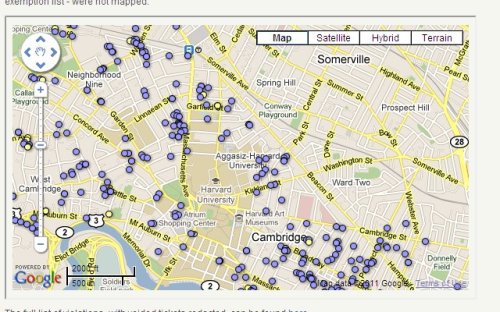Some of you may recognize the work of Saul Tannenbaum. He’s been writing for the NeighborMedia program at CCTV, which is their effort at civic journalism. While writing for CCTV (Cambridge Community Television), he filed a series of FOI requests and unearthed loads of information on the locations and fines attached to sidewalk-clearing violations during the Snowpacalypse this past winter, which he then helpfully mapped.
While the map that laid out the violations across Cambridge has been what’s gotten the most attention, Saul himself is focusing more on what his investigation reveals about Cambridge’s snow removal tracking system as a whole. To him, there were two crucial things revealed by his requests.
The good news, says Tannenbaum, is that “the time it took for Cambridge to close a complaint (that is, send an inspector and record an outcome), decreased dramatically over time. They got much better at it.” This bodes well for the future management of snowstorms like the series we saw the past four months or so. In his followup article—posted after our interview—he put up a graph showing that for the month of January, the time it took to close a complaint dropped each week, before spiking in the beginning of February. It then settled back into a pattern of decreasing every week. On the other hand, though, Tannenbaum points out that “the internal IT systems used to support this effort aren’t really very good. There are separate systems for complaints and violations, and the inspectors need to copy data from one to the other.” Not only that, but “the web reporting form for complaints is primitive and buggy.”
How did Saul Tannenbaum, a recently-retired IT Architecture and Planning employee for a local university, become the champion of everyone to ever slip on the sidewalk in front of a neighbor’s house and wonder if they were fined for not clearing it? “My first request was almost by accident,” says Tannenbaum, who had simply asked Cambridge’s Public Works Commissioner about who he should request the snow information from as part of a larger conversation. Lisa Peterson, the Commissioner, responded that “she said it was her and that she’d start working on my request,” and just like that he had filed his first request without even intending to.
His second request, which asked for even more data, took longer to get a response to, given that he filed it during the most busy snowy period of the year, meaning the Department of Public Works was quite busy. After that request was fulfilled, Tannenbaum put in a request for more up-to-date data for snow violations. This one, however, was ironically bogged down by a City Council attempt to create more transparency. You can read the full story here, but the gist is that the way the Council went about trying to facilitate Saul’s work ended up delaying it. All the same, Tannenbaum thinks he’s done at least some good by bringing the information that he has to light. As of his most recent posting, the City Council has indeed gotten the snow data from the DPW that had been impeded by their order released for public viewing here. His requests “caught the City Counci’ls attention, which is a good thing,” Tannenbaum remarks, “But how much effect that has on city processes is an open question.”
Over the next few months, Tannenbaum hopes to pursue information on all the FOI requests filed in the city of Cambridge, a pursuit he hopes will reveal successful methods of requesting.
